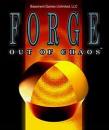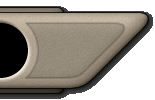
Forge: Out of Chaos

|
Forge : Out of Chaos Reviewer: Sharon Daugherty for Skirmisher Online Gaming Magazine from Fairfax, Virginia
An Excellent, Worthwhile Game System,
Forge: Out of Chaos is the core rulebook for Basement Games' fantasy roleplaying game set in the World of Juravia. A great variety of player character races, a point-based skill system rather than "professions," and new spins on game mechanics such as experience points and spell-casting highlight this worthwhile fantasy milieu.
Open this book and you're immediately surprised: while they were bending game rules, the guys at Basement Games went ahead and broke the usual table-of-contents-etc. order of book creation. Mythology of the world's beginnings fills the first few pages, explaining how the first god Enigwa shaped the sun, the world, the other gods, and finally, humankind. How the squabbling younger gods warped the basic shape of human life into other races and also created monsters, disease, and undead horrors sets the scene for the whole World of Juravia campaign.
There are eleven races for players to pick from, including humans--for me, this and the point-based skill system are among the strongest arguments for trying this system.
Humans are the base from which the other racial statistics vary--but the nonhuman choices are rich indeed. For the combat-lovers, there are the many races created by the fallen god of war: the tall Berserkers, with ridged foreheads (very Klingon in appearence) and extraordinary combat bonuses; the Higmoni, with boar-like features, rapid healing, and infrared vision; and the one-eyed, hairy Ghantu, over seven feet tall with massive combat damage. There are also Dwarves, children of the god of justice and honorable combat: their sturdy physique grants them many bonuses.
For the wizard fanciers, there are the lizard-like Kithsara, children of the god of the elements, with naturally enhanced magic talents and a powerful biting attack; the light-shunning Dunnar, created by the goddess of enchantment, with weird, almost undead appearances, exceptional night vision, and innate abilities to detect magic & shield against mind magic; and your basic, magical Elves.
More unusual character choices are the Merikii, the territorial feathered, flightless children of the goddess of beasts, Sprites (courtesy of the goddess of the harvest), and the shrew-like bipeds called Jher-ems--excellent trackers and natural empaths. Curiously enough, we are not given the mythological origins of either Elves or the Jher-ems--perhaps this is deliberate on Basement Games' part. I'd like to see a module or online rules addition covering that eventually. Basement Games has made its new rules public and free, rather than issuing scads of expensive new editions.
This multi-racial world flows naturally through the World of Juravia modules offered by Basement Games, such as The Vemora, Tales That Dead Men Tell, and The Temple of Nanghetti.
Characters are built by purchasing skills (or acquiring them through opportunities during adventures) and building them through use. If you don't use it, you don't advance in it--a much more logical approach to "experience points" to my mind. Magic itself is treated as a skill, making the profession of mage a result of learned skills (more below on mages). Resulting characters are much richer in abilities than the straightforward "I'm a fighter, I can't do that" model of some systems in which advancement is quick but capabilities are rigidly limited.
Ability to advance in skills in Forge has some built-in brakes, preventing some of these super-monster deity characters that are typical in long AD&D campaigns: in Forge, advancement is not automatic. For "experience points" the player receives chances to dice for skill advances. Also, a skill has a base score which is calculated differently for a high-level character than for a low one, changing the mechanics of advancement when base scores pass 100%. This keeps even a long campaign from acquiring the yawning "easy victory" boredom disease.
Mages, or characters who have acquired the magic skill, are of two types: practitioners of Divine Magic or of Pagan Magic. Mages of Divine Magic are of two types, requiring a bond to one's deity and adherence to particular principles: Berethenu Knights follow the god of justice and must live according to rules of Poverty, Self-sacrifice, and Honor, while Grom Warriors follow the god of war imprisoned in the underworld, and live through Personal Glory, Selfishness, and Pride. Failure to adher to the divine principles causes the Knight or Warrior to lose his magical ability, permanently in the Warrior's case. Pagan magics require spell components to activate spells and may specialize in Beast Magic, Elemental Magic, Enchantment, or Necromancy. Interesting game mechanics add variable destruction/preservation of spell components and the ability to "pump" a spell several levels in strength.
Physcial combat involves two defensive values instead of one, allowing for you AND your armor to be damaged or destroyed. Monsters run a huge gamut from various mythologies to originals from Basement Games. Minotaurs, phoenixes, and dragons share the world with various demons, scaly Mul-Hounds, Rhino Lizards, and elemental creatures such as Frost Heaves.
At Basement Games itself, you will find many additional free campaign materials and may also try the World of Juravia membership program, in which you'll receive Empire packets, ready-to-play mini-adventures, floor plans for temples and dungeons, new monsters, and much, much more.
An excellent game system--well worth it. |


